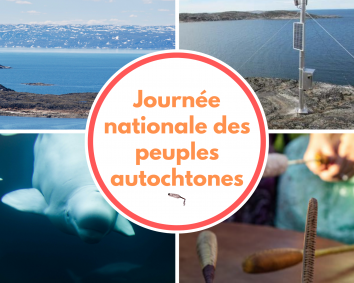Marked on the summer solstice, June 21, National Aboriginal Peoples’ Day is an opportunity to celebrate the rich and diverse cultural expressions and histories of First Nations, Inuit and Métis peoples.
Here are some of our Impulsion INRS initiatives that involve our scientists at the Institut national de la recherche scientifique working closely with First Peoples and that aspire to contribute to the well-being and sustainability of populations and the preservation of territories, with a view to reconciliation:
- The IA-CAIMAN project is a network of cameras installed in seven Nunavik communities to study the evolution of ice conditions, to advance and share knowledge on adaptation to climate change that particularly affects indigenous populations.
- iTrackDNA enables the monitoring of environmental impacts in an era of climate change through innovative, accessible and socially responsible environmental DNA analysis tools. Natural resource management decisions made by Canadian communities, First Nations and various industries require relevant information regarding the risks and effects of human activities on the environment and natural environments.
- The Climate Change, Public Health and Food Security Linkages Modeling initiative will help to better understand these issues and prioritize potential impacts on the population. The effects of climate disruption observed in Quebec are increasing social inequalities, particularly for Aboriginal and northern populations, and transforming their lifestyle and traditional food practices.
- The INRS-UQAT joint research unit (UMR) in Aboriginal studies in Val-d’Or is a centre of excellence in education, territory, self-determination, revitalization of Aboriginal languages and contemporary urbanity, generating a co-construction of knowledge that will benefit all of Quebec.

